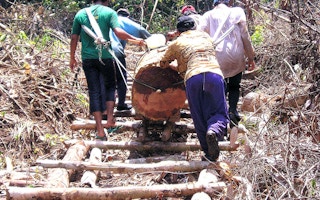Indonesia and the European Union (EU) are stepping up their partnership to combat illegal logging practices by applying the system of wood legalisation for timber exports.
Under the partnership, timber exports from Indonesia to the EU will be accompanied from now on by a licence indicating its legal guarantee that these were produced under “environment friendly” management.
Indonesia is known to have the world’s highest rate of deforestation. In 2015, a report from the Anti Forest-Mafia Coalition, which comprises environment conservation groups, said more than 30 per cent of timber products processed in Indonesia are illegal. This stems from the gap between the supply of legal wood reported by Indonesia’s Ministry of Environment and Forestry (KLHK) and the volume of processed wood produced by the timber industry.
Putera Parthama, director general of sustainable forest management at KLHK, says nobody actually tracks the statistics on illegal logging but Indonesia can use its Timber Legality Assurance System (TLAS), an online process that records timber products starting from its origin.
“
90 per cent of Indonesian timber products are legal and 100 per cent of the Indonesian timber industry is under control and regulated under the national timber legality system.
Vincent Guérend, EU ambassador to Indonesia and Brunei
“A piece of wood is legal if it comes from a legal harvest — transported, processed and marketed according to government regulations. We have 14 different sets of TLAS standards for different types of wood-producing or processing industries. Besides covering the legal aspect, the criteria include other factors such as sustainability,” Parthama notes.
The EU is the first government body to use a licence-based on this system. The licence, under the Forest Law Enforcement Governance and Trade (FLEGT) partnership agreement, will prevent illegal wood products from Indonesia entering EU member countries.
Vincent Guérend, EU ambassador to Indonesia and Brunei, says European consumers are greatly concerned with combating illegal logging. Ten years ago, some EU importers and consumers avoided Indonesian products because of illegal logging issues.
“Today, we are delighted to observe that the situation has reversed and over 90 per cent of Indonesian timber products are legal and 100 per cent of the Indonesian timber industry is under control and regulated under the national timber legality system,” he says.
Guérend adds that the start of FLEGT licensing sends a reassuring signal to European consumers that all Indonesian timber products exported to the EU are verified to conform to relevant Indonesian laws, in line with EU legislation on international timber trade.
Andy Roby, senior forestry adviser at the UK’s Department for International Development, says the licensing agreement is a positive sign because it brings the whole weight of the EU timber market in support of Indonesia’s efforts to combat illegal logging.
“Although only about 10 per cent of Indonesia’s US$10 billion timber exports go to Europe, it is a high-value market that delivers jobs and growth in Indonesia and sustains skilled rural communities in value-added industries such as furniture and handicraft,” Roby says.
This piece was produced by SciDev.Net’s South-East Asia & Pacific desk and was republished with permission.








